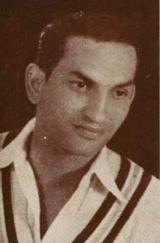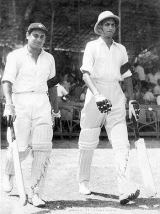I was fortunate enough to do a long interview with Mustaq Ali at his home in Indore last year. I can think of no better way of starting this obituary than relive events in his own words.

|

Mushtaq Ali - swashbuckler, crowd-pleaser and India's first overseas centurion
© Getty Images
|
|
"When I scored that hundred at Old Trafford in Manchester in 1936 in the second Test, I became the first Indian centurion overseas. The feeling of delight will remain with me for the whole of my life, more so because the hundred was instrumental in us saving the match. While I had completed my hundred before the end of the day's play, Merchant completed his hundred the next morning."
"When I was, on account of a misunderstanding with the BCCI, dropped from the side at Calcutta in 1933-34, the crowd had gheraoud Duleepsinhji. Eventually I had to rescue him saying I will certainly play."
"However much India wins at cricket these days the feeling of the first Test victory ever will always remain special. Nothing can replicate the sensation. Beating England at Chepauk on 10 February 1952 was incredible."
Even death at a ninety-and-a-half can't take any of these achievements away from India's just-departed cricketing legend.
Mushtaq Ali had picked cricket as his first love under strange circumstances. A talented hockey player, a sport in which India excelled in the 1930s, the choice before him was difficult. Problems were compounded because India was then a far superior hockey-playing nation, one which won Olympic golds with elan. However, as Ali had recounted to me a day before his 90th birthday, "At 15, I had accompanied Colonel Nayudu to Hyderabad. Not only did we travel first class, we were driven to our destination in a Rolls Royce once we landed at the station. Playing for the Maharaj of Dhanrajgir's team, we were soon flooded with gifts and having played decently I saw my name flashed in All India dailies the next day. Since then cricket had no competitor!"
One of the stars of the immensely popular Bombay Pentangular tournament, Ali was always a vocal supporter of this much maligned tournament, "There was nothing communal about the Pentangular. It was by far India's premier cricket tournament and the players were always keen to perform before huge crowds that attended the tournament year after year."

|

Mushtaq Ali (right) walks out to bat with Pankaj Roy
© Getty Images
|
|
In fact, one of the best moments of his life came when the legendary CK Nayudu, his mentor and guru, during a final between the Hindus and Muslims, encouraged a severely injured Mushtaq to play the innings of his life - a 36 against all odds that won the Muslims the tournament by the thinnest of margins - one wicket. This final, played before huge crowds in 1944, was by far the closet in the history of the Pentangular.
Ali had one regret - not having played against Bradman's invincibles in 1948 despite having been picked vice captain of the touring Indian side. Conventional understanding has it that he refused to tour because he was undecided whether to stay in India or move to Pakistan. The real reason however is much more significant and interesting. He had missed out because Ali the family man had taken precedence over Ali the cricketer. "My brother's demise had left me heart broken. Mentally I was not up to the challenge of traveling to Australia. I knew I had lost the opportunity of playing against and learning from the legendary Don Bradman. And as vice-captain I did not want to let my country down. Forced to assume responsibilities of the head of the family, I was left with little option but not travel."
How will Mushtaq Ali be remembered in India's cricket history? Simply put - as the first Indian centurion overseas. Needless to say that hundred in 1936 was extremely significant - it proved to the British that the Indians could match the colonisers at their game, and was perceived as a major nationalist triumph in contemporary India. Ali had, in fact, received telegrams from numerous homegrown cricket fans and also from the board president, the Nawab of Bhopal. In terms of sheer cricketing skill the innings stood out. Ali's hooking was spectacular. Having practiced the stroke for hours, he had made great use of it in the uncovered pitches of 1930s England. In his words, "The English weather and pitches, which were uncovered, were such that had we tried to survive without playing aggressive cricket we were certain to get out without scoring much. Attack was the need of the hour and I was rewarded for honoring my impulse."
Neville Cardus has thus described Ali, "His cricket at times was touched with genius and imagination. There was a suppleness and a loose, easy grace which concealed power, as the feline silkiness conceals the strength of some jungle beauty of gleaming eyes and sharp fangs." Going by this description it wouldn't be wrong to suggest that Virender Sehwag is a direct descendant of the Mushtaq Ali school of batsmanship.
Any takers to go down history and watch Ali bat? Maybe the films division will soon have some buyers.
Boria Majumdar is the author of Twenty-Two Yards to Freedom: A social history of Indian cricket (Penguin-Viking) and the forthcoming Indian Cricket Reader- Oxford University Press.

